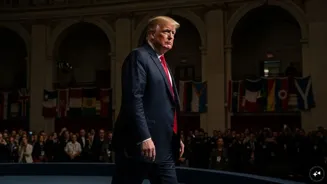From Vietnam to South Africa and Canada to Colombia, Trump’s trade playbook is less about policy and more about power posturing. Experts are calling it “tamasha diplomacy”, a dramatic show filled with bluster, misinformation and unpredictable twists.
Vietnam tariff chaos: From deal to drama
Vietnamese officials believed they had secured a deal to reduce tariffs to 11%. But just days before the July 8 deadline, Trump unilaterally hiked tariffs to 20% in a phone call with General Secretary Tô Lâm who wasn’t even part of the talks.
He then took to Truth Social to declare the deal done. No paperwork followed. No joint statement was issued. Vietnam, blindsided remains silent. Experts say such moves erode US credibility, exposing a pattern: negotiate in private, declare in public and rewrite on the fly.
Trade for trial: Brazil caught in political crossfire
Trump’s grudge against Brazil’s President Lula boiled over as he threatened 50% tariffs unless the trial of far-right President Jair Bolsonaro was halted. The move, devoid of trade logic was labelled by many as “ideologically driven blackmail.”
Lula refused to bow but the threat remains, highlighting how Trump is willing to weaponize economics to protect political allies, regardless of international norms.
Colombia: Deport or get taxed
In a bizarre turn, Colombia was hit with tariff threats simply for refusing to accept deported nationals flown in by US military planes. Bogotá cited humanitarian and legal concerns but Trump’s response was blunt: comply or face sanctions.
Colombian President Gustavo Petro pushed back, saying, “The U.S. cannot treat Colombian migrants as criminals.”
Canada: From ally to target
In early 2025, Trump invoked emergency powers to impose a 25% tariff on Canadian goods, citing Canada’s supposed role in fentanyl trafficking and illegal immigration.
Prime Minister Trudeau dismissed the rationale as “bogus,” accusing Trump of attempting “economic bullying” and even flirting with annexation. Trump’s repeated references to Canada as the “51st state” turned serious policy into a punchline.
South Africa & “White Genocide”
Tariffs on South Africa jumped to 30%, based not on economics but conspiracy. Trump echoed right-wing narratives of a “white genocide” in South Africa, a debunked and dangerous theory. Instead of diplomacy, Trump leaned into disinformation and dog-whistle politics, triggering outrage across BRICS nations.
EU blackmail: $600 billion or 35% tariffs
Calling it “Liberation Day,” Trump slapped the EU with 20% tariffs in April 2025. By July, he demanded a $600 billion investment in US infrastructure or face a blanket 35% tariff on all EU goods.
EU leaders rejected the ultimatum, calling it economic blackmail, as counter-tariffs hit key Republican exports. The standoff continues, with no clear plan, process, or paper trail.
100% chip tariff hits Japan hard
Without warning, Trump imposed 100% tariffs on semiconductor imports, crippling Japanese tech firms and rattling Asian supply chains. Toyota and Honda suffered financial setbacks. Economists slammed the move as reckless, lacking consultation or clarity.
Taiwan’s “intel ultimatum”
Trump told Taiwan it must ensure TSMC buys 49% of Intel and invests $400 billion in the US, or face a 15% blanket tariff. No formal deal exists but the threat stands. Analysts say it’s a bizarre blend of foreign policy and corporate coercion.
New Zealand: From friendly to friction
Despite a strong bilateral relationship, Trump raised tariffs on New Zealand exports to 15% overnight. Finance Minister Nicola Willis called it a “very blunt formula,” symbolizing how even long-time friends aren’t safe from the show.
A pattern of political theatre
Across continents, Trump’s trade actions have become consistent in their chaos:
*No consultation
*No paperwork
*No economic rationale
*Just social media declarations, threats, and pressure tactics
Former diplomats warn that this damages trust, undermines institutions and reduces geopolitics to personality-driven drama.
“Even when a deal seems done, Trump can change the terms unilaterally and publicly,” said a former USTR official. “It’s a nightmare for negotiators and a gift for America’s rivals.”
A global drama with real consequences
With Trump back on the world stage, diplomacy appears to have taken a back seat to drama, threats and personal agendas. Whether it’s friends like Canada and Vietnam or rivals like China and South Africa, his brand of transactional politics is turning global engagement into a reality TV-style spectacle.
In this performance, everyone’s a prop and the price of the show could be global instability.













